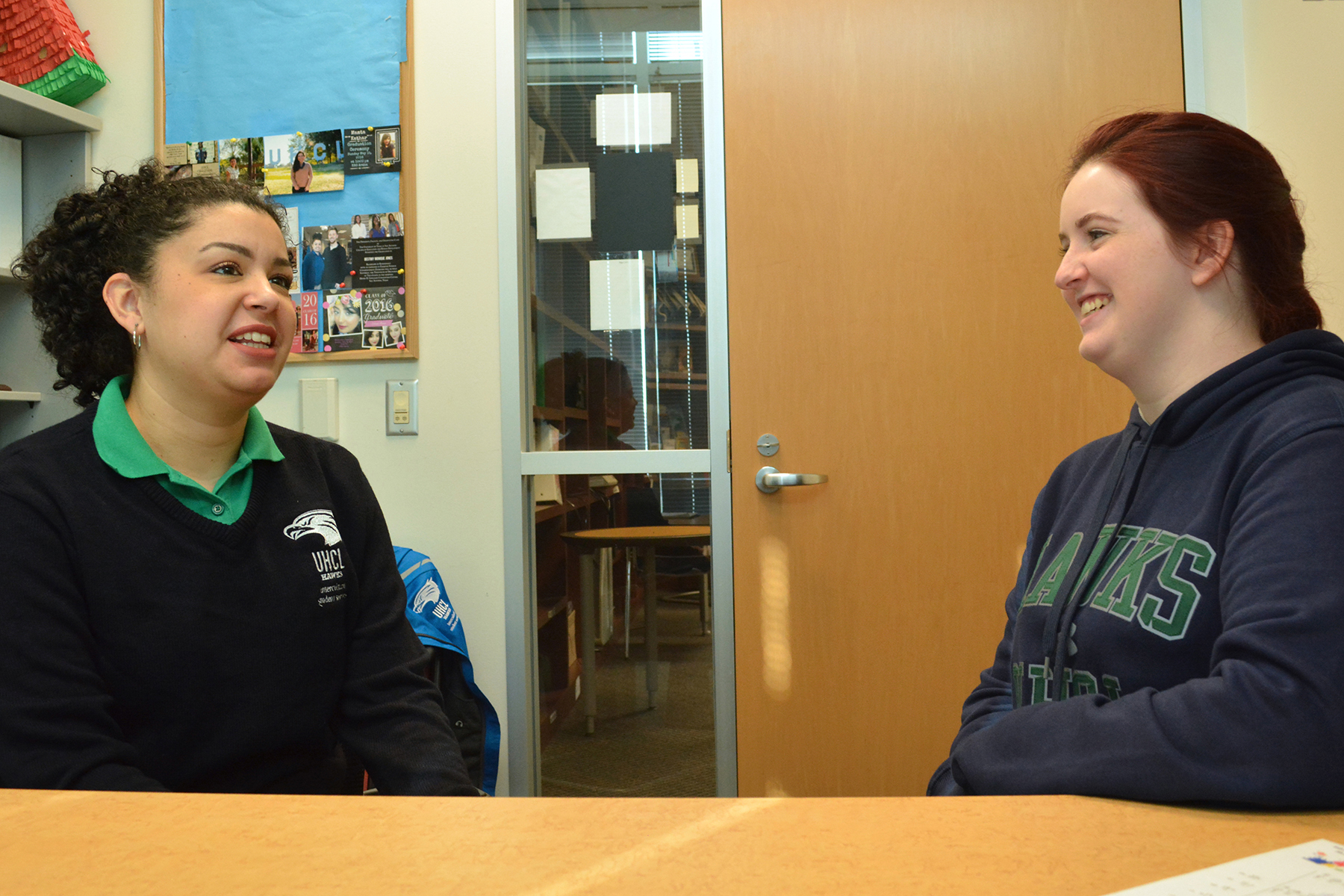- Future Students
- How to Apply
- Visit UHCL
- Admitted Students
- Tuition, Costs and Aid
- Degrees and Programs
- Contact Admissions
- Current Students
- Class Schedule
- Academic Calendar
- Advising
- Events
- Library
- Academic Resources and Support
- Student Services and Resources
- Alumni
- Lifetime Membership
- Alumni Events
- Update Your information
- Awards and Recognitions
- Give to UHCL
UHCL program supports first-generation college students
December 22, 2016 | Kelsie Cleboski

Photo by George Mattingly II
The Gen-One Program from UH-Clear Lake’s Office of Intercultural Student Services
is designed to support the success of first-generation students at the university.
Coordinator of Intercultural Student Programming, Erika Garcia (left), helps students
like Jessie Kelley (right) adjust to college life and build a support network of peers,
faculty and staff at UHCL.
Being the first member of a family to go to college comes with some tough challenges, but a growing program at University of Houston-Clear Lake is ensuring that first-generation students don’t have to go it alone.
The Gen-One Program from UH-Clear Lake’s Office of Intercultural Student Services is designed to support the success of first-generation students at the university. Now in its third year, the program focuses on be responsive to the many needs of students, said Coordinator of Intercultural Student Programming Erika Garcia.
UHCL’s fall 2015 enrollment data (the most current complete data available) indicates 3,161 students, or about 35 percent of the student body, identified themselves as first-generation college students on their university application. The Pell Institute for the Study of Opportunity in Higher Education reports that targeted support and engagement on campus is especially vital for these students.
“This is such an important population at UHCL and an important population to the state of Texas,” Garcia said. “We did not want to lose sight of these students.”
Garcia knows how important programs like this can be – she’s a first-generation college graduate herself. She explained that one challenge many first-generation students face is that their families don’t always know the best ways to support them.
“I could not have these discussions with my parents because they didn’t share these experiences,” Garcia said. “To them, I was just going to school. They could not share with me how you prepare for your success in college and how it’s different than high school.”
UHCL criminology and psychology sophomore Jessie Kelley, also a first-generation student, agreed that the transition to college can be difficult.
“The closest family member I have that has attended college is my older sister, but she attended community college and did online classes, so the transition from high school to university has been pretty difficult for me,” she said. “But I’ve made connections through the Gen-One Program, and it has helped me get through my first year of college smoothly.”
Now a student ambassador at the university, she now extends that support to others.
“Most incoming students don’t have any connections in colleges, so they’re kind of thrown into the deep end with the sharks,” she said, noting that the Gen-One Program offers students friendship and advice. “The program helps anyone from a family where college is not stressed or emphasized at home.”
Support networks are vital to every student, Garcia said, and interactions with peers, faculty and staff from a similar background are an important component of that network. Students don’t just benefit from the resources and opportunities that mentors can provide. She says sometimes all students need is a sympathetic ear.
“All populations that are underrepresented at the higher education setting need validation of their experiences,” Garcia said. “This program draws on that connection with students.”
Students founded the Gen-One Program in 2014, and since Garcia joined the university last year, an important responsibility for her position has been to lead and expand the program.
First-generation is defined by the program as any student who does not have a parent or guardian with a four-year degree. While other institutions define first-generation as students whose parents have never attended college at any level, Garcia said her office wanted to offer the program’s support to a broader audience.
Last year, the program used student surveys to guide their efforts, including social gatherings, de-stressing events and information workshops about common questions, particularly regarding finances. With a year’s worth of data, research and student feedback, Garcia plans to expand the program further and increase collaboration with departments across campus. Her vision is to create a thriving community of students who support each other through college life.
“UHCL is in a demographic and geographic situation where, for the foreseeable future, it will have a large population of first-generation students,” she said. “It’s important that we continue to respond to the needs of student populations.”
To learn more about the Gen-One Program or other services offered by the Office of Intercultural Student Services, email Garcia at garcia@uhcl.edu or visit www.uhcl.edu/intercultural-student-services.






